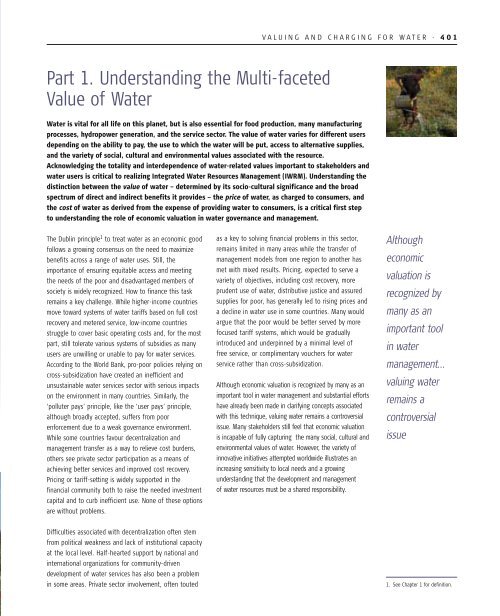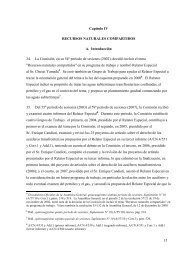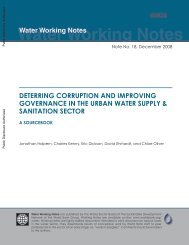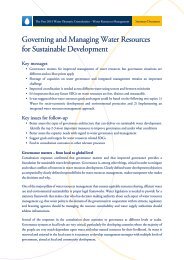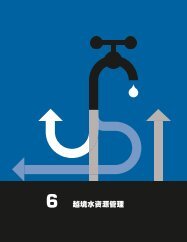Water: a shared responsibility; 2006 - UN-Water
Water: a shared responsibility; 2006 - UN-Water
Water: a shared responsibility; 2006 - UN-Water
Create successful ePaper yourself
Turn your PDF publications into a flip-book with our unique Google optimized e-Paper software.
V A L U I N G A N D C H A R G I N G F O R W A T E R . 401<br />
Part 1. Understanding the Multi-faceted<br />
Value of <strong>Water</strong><br />
<strong>Water</strong> is vital for all life on this planet, but is also essential for food production, many manufacturing<br />
processes, hydropower generation, and the service sector. The value of water varies for different users<br />
depending on the ability to pay, the use to which the water will be put, access to alternative supplies,<br />
and the variety of social, cultural and environmental values associated with the resource.<br />
Acknowledging the totality and interdependence of water-related values important to stakeholders and<br />
water users is critical to realizing Integrated <strong>Water</strong> Resources Management (IWRM). Understanding the<br />
distinction between the value of water – determined by its socio-cultural significance and the broad<br />
spectrum of direct and indirect benefits it provides – the price of water, as charged to consumers, and<br />
the cost of water as derived from the expense of providing water to consumers, is a critical first step<br />
to understanding the role of economic valuation in water governance and management.<br />
The Dublin principle 1 to treat water as an economic good<br />
follows a growing consensus on the need to maximize<br />
benefits across a range of water uses. Still, the<br />
importance of ensuring equitable access and meeting<br />
the needs of the poor and disadvantaged members of<br />
society is widely recognized. How to finance this task<br />
remains a key challenge. While higher-income countries<br />
move toward systems of water tariffs based on full cost<br />
recovery and metered service, low-income countries<br />
struggle to cover basic operating costs and, for the most<br />
part, still tolerate various systems of subsidies as many<br />
users are unwilling or unable to pay for water services.<br />
According to the World Bank, pro-poor policies relying on<br />
cross-subsidization have created an inefficient and<br />
unsustainable water services sector with serious impacts<br />
on the environment in many countries. Similarly, the<br />
‘polluter pays’ principle, like the ‘user pays’ principle,<br />
although broadly accepted, suffers from poor<br />
enforcement due to a weak governance environment.<br />
While some countries favour decentralization and<br />
management transfer as a way to relieve cost burdens,<br />
others see private sector participation as a means of<br />
achieving better services and improved cost recovery.<br />
Pricing or tariff-setting is widely supported in the<br />
financial community both to raise the needed investment<br />
capital and to curb inefficient use. None of these options<br />
are without problems.<br />
as a key to solving financial problems in this sector,<br />
remains limited in many areas while the transfer of<br />
management models from one region to another has<br />
met with mixed results. Pricing, expected to serve a<br />
variety of objectives, including cost recovery, more<br />
prudent use of water, distributive justice and assured<br />
supplies for poor, has generally led to rising prices and<br />
a decline in water use in some countries. Many would<br />
argue that the poor would be better served by more<br />
focused tariff systems, which would be gradually<br />
introduced and underpinned by a minimal level of<br />
free service, or complimentary vouchers for water<br />
service rather than cross-subsidization.<br />
Although economic valuation is recognized by many as an<br />
important tool in water management and substantial efforts<br />
have already been made in clarifying concepts associated<br />
with this technique, valuing water remains a controversial<br />
issue. Many stakeholders still feel that economic valuation<br />
is incapable of fully capturing the many social, cultural and<br />
environmental values of water. However, the variety of<br />
innovative initiatives attempted worldwide illustrates an<br />
increasing sensitivity to local needs and a growing<br />
understanding that the development and management<br />
of water resources must be a <strong>shared</strong> <strong>responsibility</strong>.<br />
Although<br />
economic<br />
valuation is<br />
recognized by<br />
many as an<br />
important tool<br />
in water<br />
management…<br />
valuing water<br />
remains a<br />
controversial<br />
issue<br />
Difficulties associated with decentralization often stem<br />
from political weakness and lack of institutional capacity<br />
at the local level. Half-hearted support by national and<br />
international organizations for community-driven<br />
development of water services has also been a problem<br />
in some areas. Private sector involvement, often touted<br />
1. See Chapter 1 for definition.


